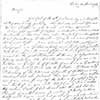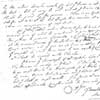Footnote 1
The letter dated 26th March has been lost.
×Footnote 2
Hume had been serving as a British chargé d’affaires in Paris since November 1763.
×Footnote 3
These two quartos (“Tudors”) comprise the fourth edition of volumes 3–4 of Hume’s 6-volume
History of England. Millar ordered a modest 250 copies of volume three from the printer William Strahan this same month; no print record survives for volume four.
×Footnote 4
In August 1766, Strahan printed 1,500 copies of a 10-leaf set of cancelled quarto pages, comprising Hume’s insertions on Charles II and James II. These cancelled pages were pasted onto existing quarto stock (ordered from Strahan in 1762 and 1763), to be issued by Thomas Cadell as “A New Edition, Corrected” in six quarto volumes. Cancelled quarto pages were also bound in with octavo volumes printed by William Bowyer in 1763.
×Footnote 5
Hume and Millar had shared their historical opinions before. In February and March 1755, Millar had engaged Hume in an extensive discussion over the relative merits of Charles I’s explanations of a royalist commission to Ireland during the Civil War. This correspondence involved Thomas Birch, who politely disagreed with Hume’s faith in Charles’s denials of involvement. See
F. Waldmann, ed., Further Letters of David Hume (Edinburgh: Edinburgh Bibliographical Society, 2014), 29–33.
×Footnote 6
Hume elicited this plea in the conclusion of his letter to Millar of 18 April: “I pass my time very agreeably here; tho’ somewhat too much dissipated for one of my Years & Humour.” See
J. Y. T. Greig, ed., Letters of David Hume (Oxford: Oxford UP, 1932) vol. 1, 433, 434.
×Footnote 7
On 19 January 1768, Hume wrote to Adam Ferguson: “[I] am tempted,
by the Importunity of Friends, to think of continuing my History . . . Andrew Millar, very naturally, thinks money will be a great Temptation to me: Others, equally silly, talk to me of Fame: Some, with no less Reason, of Truth . . . The Devil is in it, if I have not learned by this time, how little disposd the World is to receive Truth; of how little Value their Opinion is; and what a moderate Fortune is sufficient, for all the Necessaries of Life.” See
V. Merolle, ed., The Correspondence of Adam Ferguson (London: Chatto, 1995) vol. 1, 79.
×Footnote 8
de Novo, i.e., afresh. Lord Bute had recently encouraged Hume’s friend William Robertson to write a competing history of England, to which Robertson was giving some consideration. Bute made this proposal shortly after Hume completed his final volume in 1761; Lord Chesterfield had made a similar suggestion to Robertson earlier. On 28 March 1763, Hume blamed Bute for turning English opinion against Scottish authors, suggesting Bute “is obligd to make me some Compensation for this”. See also
J. McKelvey, “William Robertson and Lord Bute”, Studies in Scottish Literature 6 (1968–9) 238–47. Back in 1753, when Millar had asked Hume whether Robertson’s
History of Scotland would compete with his
History of England, Hume had replied: “Some part of his Subject is common with mine; but as his Work is a History of Scotland, and mine of England, we do not interfere; it will rather be an Amusement to the Reader to compare our Method of treating the same Subject.” See
E. C. Mossner, Life of David Hume, (Oxford: Oxford UP, 1980) 396.
×Footnote 9
In a letter of 5 January 1753 to his friend Dr John Clephane, Hume had described his project as “a History of Britain, from the Union to the present time”. See Greig,
Letters of David Hume, vol. 1, 170. As late as January 1773, Strahan would write to him, “I altogether dispair of seeing a continuation of your History from yourself”, discussing with Hume the suitability of John Dalrymple, John Douglas, James Macpherson, or Andrew Stuart, as authors of a continuation. Reports of Hume’s definitive refusal to continue his
History were not published until shortly after his death. The
New Evening Post quoted Hume to Strahan: “I must decline not only this offer, but all others of a literary nature for four reasons: because I’m too old, too fat, too lazy, and too rich.” See Mossner, 556.
×Footnote 10
Hume had requested for an acquaintance the first volume of Edward Coke’s four-part
Institutes of the Laws of England, frequently printed to 1719.
A New and Correct Catalogue (London: np, 1767) priced a complete set at £7.10.0. See Greig, ed.,
Letters of David Hume, vol. 1, 434.
×Footnote 11
is wrote for, i.e., is requested.
×Footnote 12
as you should, i.e., as you should have—“I should send the best, as you would wish, since you did not fix a specific price.”
×Footnote 13
i.e., if the customer does not stipulate fixed prices, I assume they want the best.
×Footnote 14
retd, i.e., returned.
×Footnote 15
The Charges, i.e., the shipping charge, not the purchase price.
×Footnote 16
1/45, i.e., £/45 or 45 shillings, thus £2.5.0.
×Footnote 17
Sir John Gordon of Invergordon (1707–83) was notorious for litigating against challengers for his Parliamentary seat (Cromartyshire); he also made numerous proposals for amending legal rights concerning tenant farmers in Scotland. See
History of Parliament: the House of Commons 1754–1790, ed. L. Namier et al., (London: Her Majesty’s Stationery Office, 1964) vol. 2, 515–6;
J. M. Bulloch, The Families of Gordon of Invergordon &c. (n.s.: Ross-shire Printing, 1906).
×Footnote 18
Millar was interrupted in his letter by Sir John Gordon calling and asking him to remind Hume about Gordon’s request for documents from Paris. Millar now tells Hume to send these to his shop, with a note of the associated costs, which Sir John will repay.
×Footnote 19
Lucy Elstob Mallet, second wife of the poet David Mallet. “I saw a few days ago Mrs Mallet, who seems to be going upon a strange project of living alone in a Hermitage, in the midst of the Forrest of Fontainbleau.” See Greig, ed.,
Letters of David Hume, vol. 1, 434.
×Footnote 20
Harrogate, a fashionable spa in Yorkshire, 210 miles from London on the Great North Road.
×


 by the other Books wrote for but yt Person would chuse the best.[13] but it may be retd[14] and all I desire The Charges should be paid by the person.[15] There is an Edition yt is sold for abt 2:2: or l/45[16] but People here consider it as of litle value in comparision of that Sort.
by the other Books wrote for but yt Person would chuse the best.[13] but it may be retd[14] and all I desire The Charges should be paid by the person.[15] There is an Edition yt is sold for abt 2:2: or l/45[16] but People here consider it as of litle value in comparision of that Sort.